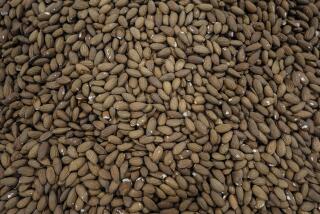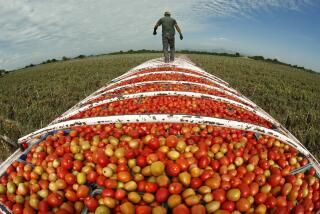Money in Melons : Lindemann Produce services its worldwide market year-round.
- Share via
LOS BANOS, Calif. — It is 9 in the morning as George Lindemann, president of one of the nation’s biggest shippers of cantaloupes and honeydew melons, checks his computer screen.
“We’ve sold 17,000 cartons so far this morning,” he says. “We have 2,000 cartons left to sell. We have already sold 15,000 cartons (for delivery) tomorrow, 10,000 cartons the next day and 7,000 cartons the day after that.”
Lindemann Produce Inc., headquartered in this San Joaquin Valley farming center, owns no farmland but--because of arrangements with growers from California to Panama--is the only melon shipper, so far as is known, that markets the fruit year-round.
Members of the Lindemann sales force in Los Banos start work each day at 5 a.m., on the phone with buyers for chain stores, brokers and wholesalers representing 1,500 companies.
The company ships melons--most under the Lindy’s Delight label--every month to all 50 states and to every province in Canada. It also exports honeydews to Hong Kong, Singapore, Japan and Taiwan.
Less than a mile from company headquarters one day recently, 150 workers were busy processing hundreds of tons of cantaloupes and honeydews being unloaded from a steady stream of trucks onto conveyor belts leading into two huge packing sheds.
On nearby farms, migrant workers were hand-picking ripe melons from the vines. In an 18- to 20-day period, pickers typically go through a cantaloupe field 13 times, each time judging the fruit by its color and picking only at the peak of ripeness.
California and Arizona together account for 70% of the U.S. crop, producing about 26 million cartons of cantaloupes on 65,000 acres and 10 million to 12 million cartons of honeydew on 20,000 acres.
Of those totals, Lindemann’s U.S. growers produce 2.5 million to 3 million cartons of cantaloupes on 8,000 acres and 1.7 million to 2.2 million cartons of honeydews on 3,200 acres between May and late November every year.
The average price received by the grower is $4.50 for a 40-pound carton--about 11 cents a pound, compared to the 29 to 49 cents a pound the melons cost at California stores this year.
Lindemann, 46, whose family has been farming in the San Joaquin Valley for 66 years and producing melons for 47 years, said, “We have joint venture partnerships with 55 growers in California and Arizona, with eight growers in Mexico and nine growers in Honduras, Guatemala, El Salvador and Panama. Our winter crop comes from Mexico and Central America,” where Lindemann growers produce about a million cartons of both kinds of cantaloupes and honeydews combined.
The company, which provides farmers with half of the cost of producing the melons, harvests and markets the crop. “We share the risk with the growers and split the profits with them,” Lindemann said.
Until five years ago, the company owned 12,000 acres in the Los Banos area--land devoted to grapes, almonds, peaches, beef cattle, dairy herds and cotton. But then the land was sold and 85% of Lindemann’s business is now made up of processing and marketing cantaloupes and honeydews, with the rest involving other melons, lettuce, apricots and asparagus.
Because cantaloupes are so perishable, every effort is made to get them to market as quickly as possible. Cantaloupes picked are often for sale in California’s supermarkets within 24 hours of being picked. To truck them to the East Coast, however, takes about five days, so refrigerated trucks are used--with freight costs often as much as the cost of the melon.
Honeydews have a thicker rind than cantaloupes and remain in stable condition much longer. They are carried by ship to East Asia, where Lindemann sells $1.5 million to $2 million worth a year.
More to Read
Inside the business of entertainment
The Wide Shot brings you news, analysis and insights on everything from streaming wars to production — and what it all means for the future.
You may occasionally receive promotional content from the Los Angeles Times.










